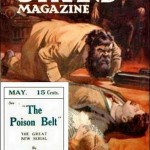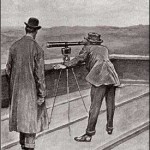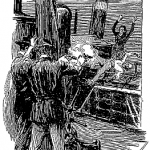Through the murkiness of the night they saw a single light flickering dimly ahead of them. This was evidently the goal at which Ezra was aiming. As they toiled on it grew larger and brighter, until it resolved itself into the glare of a lamp shining through a small diamond-paned window. Girdlestone recognized the place now. It was the hut of a fisherman named Sampson, who lived a mile or more from Claxton. He remembered having his attention attracted to the place by the curious nature of the building, which was constructed out of the remnants of a Norwegian barque stranded some years before. The thatch which covered it and the windows and door cut in the sides gave it a curiously hybrid appearance, and made it an object of interest to sightseers in those parts. Sampson was the owner of a fair-sized fishing-boat, which he worked with his eldest son, and which was said to yield him a decent livelihood.
“What are you going to do?” asked Girdlestone, as his son made his way to the door.
“Don’t look like a ghost,” Ezra answered in an angry whisper.
“We’re all safe, if we are only cool.”
“I am better now. You can trust me.”
“Keep a smiling face, then,” said Ezra, and knocked loudly at the door of the hut. The occupants had not heard their approach owing to the storm, but the instant that the young merchant struck the door there was a buzz of conversation and the sharp barking of a dog. Then came a dull thud and the barking ceased, from which Ezra concluded that some one had hurled a boot at the animal.
“We hain’t no bait,” cried a gruff voice.
“Can I see Mr. Sampson?” asked Ezra.
“I tell ‘ee we hain’t no bait,” roared the voice in a more irritable tone.
“We don’t want bait. We want a word of talk,” said Ezra.
As he spoke, the door flew open, and a burly middle-aged man, in a red shirt, appeared, with a face which was almost the same colour as his garment. “We hain’t got no—” he was beginning, when he suddenly recognized his visitors and broke short off, staring at them with as much surprise as it is possible for human features to express.
“Well, if it ain’t the genelman from the Priory!” he exclaimed at last, with a whistle, which seemed to be his way of letting off the astonishment which would otherwise remain bottled up in his system.
“We want a minute’s talk with you, Mr. Sampson,” said Ezra.
“Surely, sir—sure-ly!” the fisherman cried, bustling indoors and rubbing the top of two stools with his sleeve. “Coom in! ‘Ere, Jarge, pull the seats up for the genelmen.”
At this summons, a lanky, big-boned hobbledehoy, in sea boots, pushed the stools up towards the fire, on which a log of wood was blazing cheerily. The two Girdlestones sat warming themselves, while the fisherman and his son surveyed them silently with open eyes and mouth, as though they were a pair of strange zoological curiosities cast up by the gale.
“Keep doon, Sammy!” the fisherman said hoarsely to a great collie dog who was licking at Girdlestone’s hands. “What be he a suckin’ at? Why, sure, sir, there be blood on your hands.”
“My father scratched himself,” said Ezra promptly.





